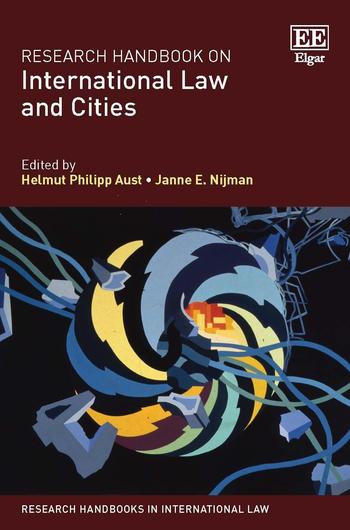Book discussion at the Graduate Institute in Geneva
Buchcover Research Handbook on International Law and Cities
Bildquelle: Elgaronline / The online content platform for Edward Elgar Publishing
News vom 08.04.2022
International Organisations and Cities: An Accelerating relationship Reshaping Both?
The Global Governance Centre and the Department of International Law as well as the Department of Law of Freie Universität Berlin invite you to a panel discussion on the occasion of the publication of the Elgar Research Handbook on International Law and Cities, on 28 April 2022, at 5pm, in Auditorium A2.
“In an interconnected world, we need a networked multilateralism, in which the United Nations family, international financial institutions, regional organizations, trading blocs and others work together more closely and more effectively. We also need, as the [UNGA] President said, an inclusive multilateralism, drawing on civil society, cities, businesses, local authorities and more and more on young people.”
UN Secretary-General António Guterres, 21 September 2020
The world is facing ‘a surplus of multilateral challenges and a deficit of multilateral solutions’, UN Secretary-General António Guterres observed at the General Assembly meeting marking the seventy-fifth anniversary of the United Nations on 21 September 2020. At this occasion, Guterres expressed the need for a ‘more — and more effective — multilateralism, with vision, ambition and impact.’ To reinvigorate multilateralism, the UNSG in line with his predecessors reaches out to cities and their governments as natural partners to face this world’s many challenges.
With their recent ascent to become globally relevant actors, cities have also sought to establish relations with International Organizations (IOs). Likewise, IOs have turned to the city. For both sides, this looks like a win-win situation: cities can rely on IOs in order to bolster their claim that they deserve the proverbial seat at the table when it comes to meaningful international processes. And IOs often find in cities willing partners for implementing their projects, and as such, for delivering the objectives of their mandate. In addition, cities assist international organisations to interact with citizens on the urban streets and as such may strengthen the institutions’ legitimacy. At times, cities appear to be more attractive counterparts than recalcitrant nation states. These simultaneous processes occur against the background of an ever-denser web of international normative expectations when it comes to questions of good urban governance, a development spurred not least by important policy documents like the Sustainable Development Goals (SDGs) and the New Urban Agenda, which builds on SDG 11 specifically.
This panel discussion, taking place on the occasion of the publication of the Elgar Research Handbook on International Law and Cities seeks to deepen our understanding of the underlying dynamics. Why do IOs turn to cities? What are the functions cities fulfil for IOs? Do cities close governance gaps, or create governance tensions? Is this underlying dynamic closing the Global North – Global South divide, or reproducing it? How does the engagement with cities (re)shape international institutional practices? How is the turn to the urban influencing global policy and international lawmaking as traditionally taking place at IOs? Moreover, what does this development for cities and their urban spaces imply with a view to the professed ambition of many local governments to turn their metropolitan areas for instances into “smart sustainable cities”?
Program
17:00 - Welcome
Grégoire Mallard, Director of Research, the Graduate Institute
17:05 - Introduction
Janne Nijman, Professor of International Law, the Graduate Institute
17:15 - Panel discussion
Moderated by Helmut Aust, Professor of Law, Freie Universität Berlin
Speakers:
-
Mythili Menon, ITU Focal Point on Environment and Smart Sustainable Cities.
-
Nico Krisch, Professor of International Law at the Graduate Institute
-
Gulnera Roll, UN Economic Commission for Europe (UNECE) / ECE Forum of Mayors
-
Robbert Lewis-Lettington, UN-Habitat
18:30 - Drinks

